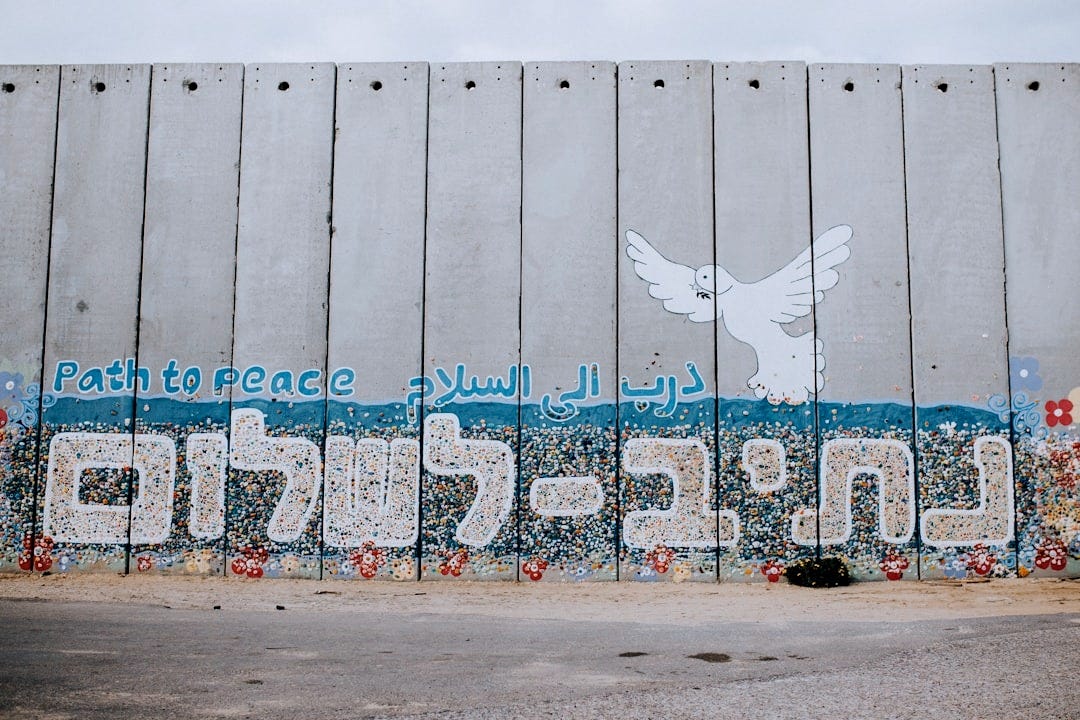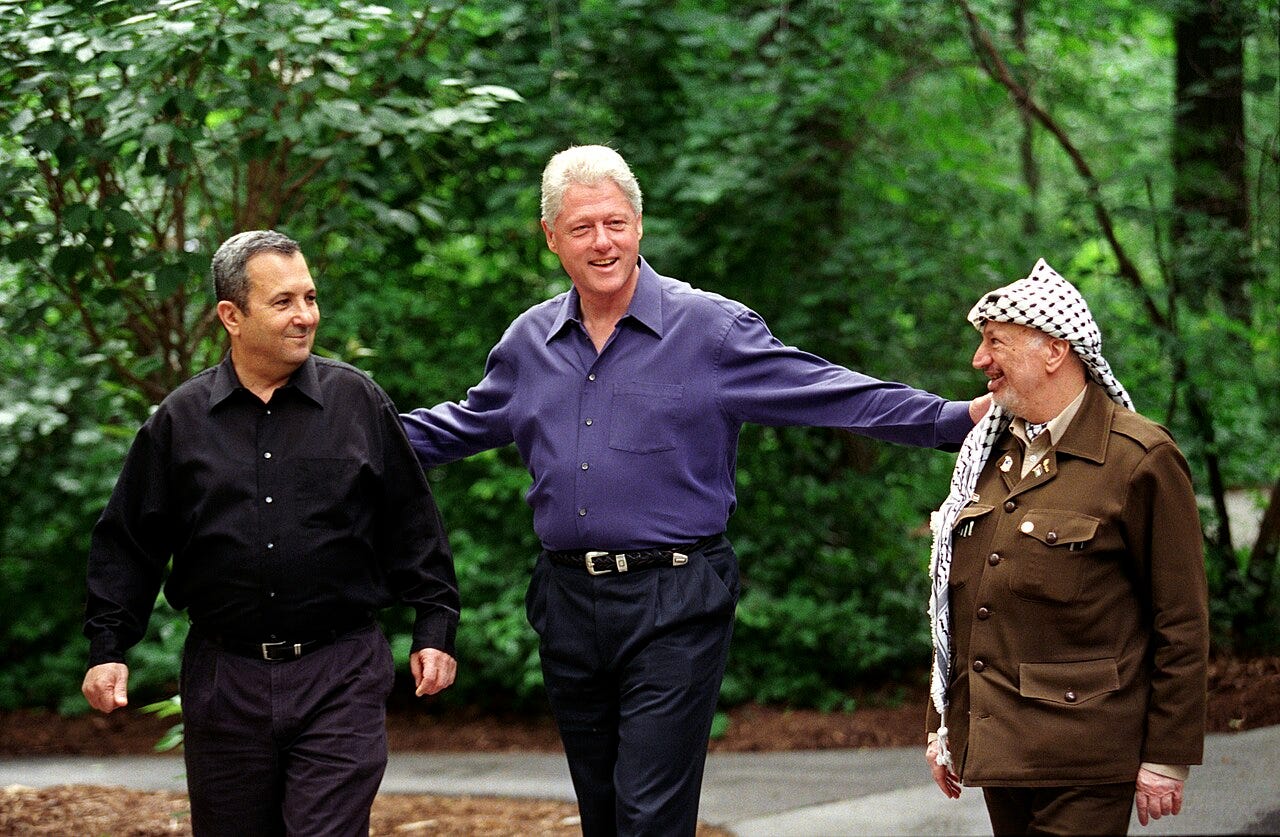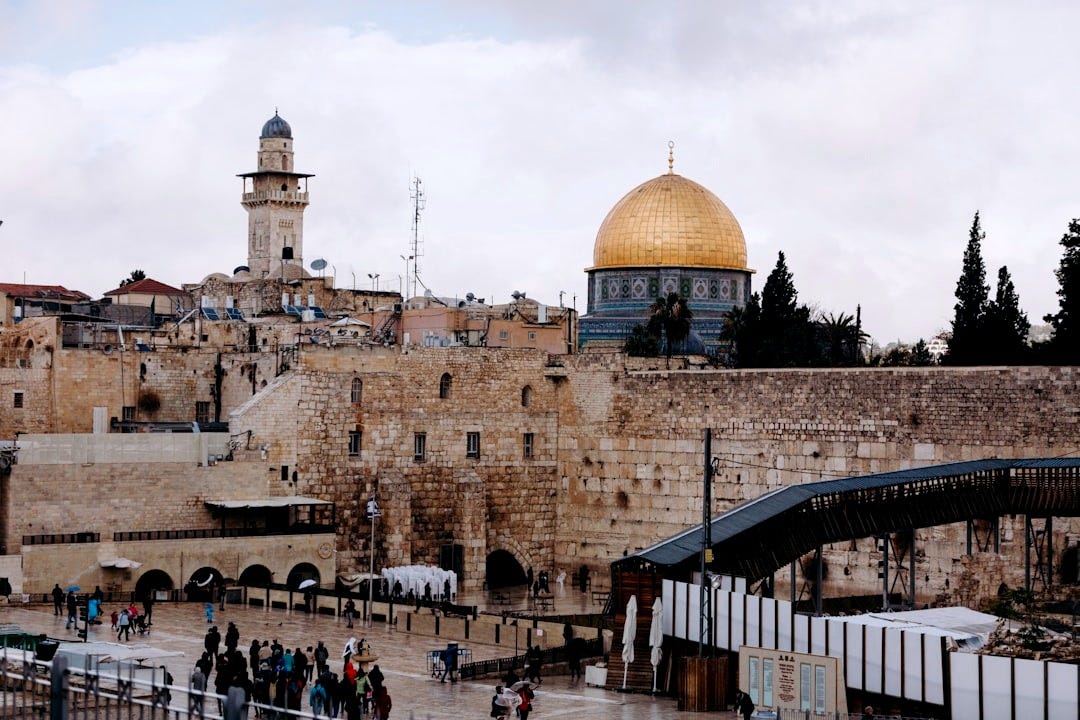A real Middle East peace plan starts with security for Israel.
After October 7th, security isn’t hardline. It’s baseline.

Please consider supporting our mission to help everyone better understand and become smarter about the Jewish world. A gift of any amount helps keep our platform free of advertising and accessible to all.
This is a guest essay by Adam Hummel, a lawyer in Toronto.
You can also listen to the podcast version of this essay on Apple Podcasts, YouTube Music, YouTube, and Spotify.
“We must also recognize, we must also respect, and we must also guarantee the safety and security of Israel. Only then we can have real peace.” — Indonesian President Prabowo Subianto, last week during his United Nations speech
The secret to peace in the Middle East is not for Israel to suddenly recognize a Palestinian state next door.
“Recognize Palestine” may be a nice slogan, but it collapses under the weight of actual reality.
If you want to understand why, the place to start is security. Not settlements. Not borders. Not even Jerusalem. Security. Because for Israel, the only Jewish state in the world that rarely gets a peaceful night’s sleep, security is not an abstract concept; it is the thin line between life and death, between a functional peace and the nightmare that unfolded on October 7, 2023.
To appreciate why security is the first issue — the one that all other issues depend on — you must understand the history of negotiations, the kinds of guarantees that have been on the table, and why they’ve never been nailed down.
During the 1990s, the Oslo Accords were branded as “the” peace deal between Israel and the Palestinians. They weren’t. Oslo created a process, not a final settlement. Israel recognized the Palestine Liberation Organization (a political-terror organization, similar to Hamas) as the representative of the Palestinian people. The Palestinians in turn recognized Israel’s right to exist. Both agreed to a five-year transitional period where Palestinians would gradually gain control over parts of the West Bank and Gaza.
But the hardest questions were explicitly postponed. Security, Jerusalem, refugees, borders, and settlements — all were listed as “final status” issues. The idea was to build trust first, then resolve the core disputes later.
That “later” still hasn’t come.
By the summer of 2000, when the Oslo Accords were already well off-the-rails, the parties finally tried to tackle the final status basket at Camp David, hosted by then-U.S. President Bill Clinton. For Israel, the biggest sticking point was security. The nightmare scenario was clear: a Palestinian state armed to the teeth, with borders just kilometres from Jerusalem and Tel Aviv, and hostile actors (such as Hamas, Hezbollah, and Iran) exploiting that geography.
Israel’s position was that a Palestinian state could exist, but it had to be demilitarized. Police, yes. Border guards, yes. Tanks, artillery, fighter jets — hard no. For Palestinians, that sounded like independence without sovereignty. For Israelis, it was the minimum necessary to avoid national suicide.
The talks collapsed without agreement. Each side blamed the other, and the Second Intifada exploded soon after, with its wave of Palestinian suicide bombings and terror attacks.
To add salt to the wound, at Camp David then-Israeli Prime Minister Ehud Barak offered more to then-Palestinian leader (and mega-terrorist) Yasser Arafat than the Israelis had ever offered to the Palestinians before. No counter-offer was made by Arafat, just blanket rejection, followed by a brutal campaign of Palestinian terrorism during the Second Intifada. Arafat’s rejection was characterized as a “crime” and “tragedy” by Prince Bandar of Saudi Arabia, and Clinton has made clear ever since that the negotiations fell apart because Arafat refused to play ball.

In December 2000, three months into the bloody Second Intifada and a month before his term as U.S. president ended, Clinton tried one more time to rescue the peace process with a set of principles that became known as the Clinton Parameters. For security, he proposed:
A non-militarized Palestinian state.
Israel could keep three early-warning stations inside Palestinian territory for a limited time (mostly throughout the Jordan Valley).
Israel would withdraw from the Jordan Valley, the geographic buffer between Israel and Jordan, after 36 months and with an international force stationed there.
Israel would retain the right to deploy forces in Palestinian territory in emergencies, on pre-agreed routes.
This was the closest anyone had come to a concrete security formula. The Israelis said it was a basis for negotiation. The Palestinians rejected it as too one-sided and, again, offered no counter-proposal.
In January 2001, negotiators met in Taba, an Egyptian resort town. This was the closest the two sides ever got to a comprehensive deal. On security, they essentially agreed to work within the Clinton Parameters framework. But time ran out. Israeli elections were looming, and Ariel Sharon was about to replace Ehud Barak as prime minister. Sharon had no interest in continuing the talks. Taba ended without signatures.
Fast forward to 2007. Almost eight years of a brutal intifada. Arafat is dead, Sharon is in a coma, Israel’s security barrier is largely built, Mahmoud Abbas is elected Palestinian president, and the Second Lebanon War ended with an embarrassing non-victory for Israel.
At the United States Naval Academy in Annapolis, Maryland, then-Israeli Prime Minister Ehud Olmert offered President Abbas what many consider the most generous Israeli map ever put forward:
A state on about 94 per cent of the West Bank, with land swaps to compensate (including a dedicated highway to connect Gaza and the West Bank)
Jerusalem to be divided under the principle that Jewish neighbourhoods built after 1967 would be part of Israel, and Arab neighbourhoods that were not part of Israel before 1967 would be part of Palestine
The Temple Mount would be placed under an international trusteeship
A symbolic number of Palestinian refugees would be allowed to “return” to Israel, and others would receive financial compensation
But even then, security was non-negotiable. Olmert insisted on an Israeli presence in the Jordan Valley for years to come, plus the demilitarized condition. Even after 36 meetings between Olmert and Abbas leading up to this proposal, Abbas predictably balked — like Arafat, not offering any counter-proposal whatsoever — negotiations dragged, and Olmert left office shortly thereafter under corruption charges. Benjamin Netanyahu would be re-elected as Israeli prime minister the following year.
Then, during Barack Obama’s presidential administration, Secretary of State John Kerry pushed for another attempt at final status talks. To address security, he brought in U.S. General John Allen, a retired Marine with a reputation for creative planning. Allen’s team drew up detailed proposals: drones, electronic sensors, joint patrols, international monitors, and a phased Israeli withdrawal from the Jordan Valley. The goal was to reassure Israel that technology could replace boots on the ground and give them peace of mind, while also relying on foreign forces for security.
Israel’s security establishment wasn’t convinced. Technology breaks (as we learned the hard way on Gaza’s border in October 2023). International forces pack up when things get hard (see: UNIFIL in Lebanon). Israel can only rely on Israel. In the end, nothing came of it.
If all that sounds abstract, look at Gaza. In 2005, Israel unilaterally withdrew from the Gaza Strip. The hope was that disengagement would reduce friction. Instead, Hamas took over in 2007, built an arsenal of rockets, dug more than 360 kilometres of terror tunnels, and launched repeated wars. October 7, 2023 was the culmination of that trajectory. Mosab Hassan Yousef, the son of one of Hamas’ founders, defected to Israel in 1997. He recently said of Israel’s disengagement from Gaza in 2005:
“October 7th did not happen because the Palestinians didn’t have a state. It happened because they did.”
For Israelis, Gaza is the case study in what happens when you hand over territory without enforceable security guarantees. It’s why even dovish Israelis now say: never again without rock-solid assurances, and with no Hamas in existence.
The issue boils down to this:
Israel wants security it can enforce itself. Not promises, not paper guarantees, not blue-helmeted UN soldiers. Actual control of borders, airspace, and the Jordan Valley, at least for a long transition.
Palestinians want sovereignty that feels real. That means no foreign soldiers on their soil, no foreign army controlling their airspace, no veto on what kind of police force they can have.
Those two positions are fundamentally at odds. From Israel’s perspective, compromise on security could be suicidal. From the Palestinian perspective, compromise on security could turn their “state” into little more than an autonomy zone. After October 7th, Israelis will never be prepared to take even the smallest chance at trusting any Palestinian government with the hint of fundamentalist Islamist influence.
The Palestinian Authority has long argued that it can handle its own security if given the tools. They point to cooperation with Israeli intelligence in the West Bank, which at times has prevented terror attacks. Indeed, for the last thirty or so years, there has been joint cooperation between Palestinian and Israeli security forces in parts of the West Bank. They argue that full demilitarization strips them of dignity, that no “normal” state exists without an army.
At different points, Palestinian negotiators have accepted the idea of a temporary international force in the Jordan Valley, or even time-limited Israeli presence. And there are, every now and then, rumblings that they may even accept a demilitarized state in the future. But the Palestinians consistently reject the notion of permanent restrictions on sovereignty, even while continuing their “pay-to-slay” government policy, glorifying “martyrs,” and inciting violence in their media and schools. The credibility gap is enormous.
There are also additional realities that Israel can’t ignore: Palestinian territory does not exist in a vacuum. The Islamic Republic of Iran has funded, armed, and directed Hamas and Palestinian Islamic Jihad for years. A sovereign Palestine without restrictions could easily remain Iran’s forward base against Israel.
What’s more, Israel is barely the size of New Jersey. Giving up defensible borders without guarantees is not the same as France ceding a strip of farmland to Belgium. When just a few kilometres separate the West Bank from Jerusalem and Tel Aviv, security isn’t negotiable.
As noted above, Israel has repeatedly put detailed maps and security offers on the table, only to be met with rejection and no counter-offers. In that context, recognition of a Palestinian state rewards intransigence rather than compromise.
When Israel signed peace treaties with Egypt and Jordan, the deals stuck because the other side honoured their commitments, ended their war footing, and enforced security. With the Palestinians, that consistency has never existed.
This is why “recognizing Palestine” isn’t a magic wand. You can’t conjure a state into existence without answering the question: Who keeps it from becoming a launchpad for the next war?
For Israel, the lesson of history is simple: Every time security is treated as a detail to be ironed out later, it explodes. Literally. And so, security remains one of the great unresolved final status issues. Until it is addressed with imagination, realism, and enforceable guarantees, any talk of statehood is just that: talk.
This includes the issue of Jerusalem.
For Jews and Israelis, Jerusalem is the capital: not just politically, but historically and spiritually. For Palestinians, East Jerusalem is the city they want as the capital of their own future state. And layered on top of both claims are the religious dimensions: Jewish, Christian, and Muslim holy sites clustered within a single square kilometre of the Old City.
That is why Jerusalem has always been one of the five “final status” issues reserved for negotiation, and why it has repeatedly made or broken peace talks. To quote the fictional Israeli Prime Minister Zahavy from The West Wing, “My right eye will fall out, my right arm will fall off, before I ever sign a document giving up Jerusalem!”
There has never been any consensus about Jerusalem.
Jerusalem is not just a political capital. It is a city of symbolic weight. For Jews, it has been the centre of prayer and longing for thousands of years. We face Jerusalem to pray, we end our Passover seders declaring “Next year in Jerusalem,” and the city is mentioned 667 times in the Torah.
For Muslims, the Temple Mount (Haram al-Sharif) is considered the third-holiest site in Islam (after Mecca and Medina), though Jerusalem is not mentioned once in the Quran. For Christians, the Church of the Holy Sepulchre is one of the most sacred sites in the world, said to be the location of Jesus’ crucifixion and entombment.
Israel’s stance has evolved, but certain principles have remained consistent:
Jerusalem is Israel’s capital. In December 1949, Israeli Prime Minister Ben Gurion declared that Jerusalem was Israel’s capital city. Since 1967, when the Old City and East Jerusalem were taken from Jordanian control, Israel has insisted that the entirety of Jerusalem remain united under its sovereignty. Over the years, negotiators have shown openness to functional divisions, but not to re-dividing the city with barbed wire, checkpoints, and violence as it was between 1948 and 1967.
Access to holy sites must be guaranteed. Israel points to its record since 1967 of keeping access open for all religions, compared to the Jordanian period (1948 to 1967) when Jews were barred from the Old City and the Jewish Quarter and its synagogues were all destroyed. Under Israel’s stewardship, Christians, Muslims, and Jews have all had access to their holy sites.
Security control is essential. No arrangement can put the Old City or the Temple Mount beyond Israel’s ability to prevent violence or terror. Repeated riots, stabbings, and incitement show what happens when extremists are given free rein.
Arab neighbourhoods could be administered separately. In negotiations, Israel has shown willingness for Arab areas in East Jerusalem to be under Palestinian civic or even sovereign authority, provided Israel retains some security oversight given the proximity to Israeli territory and population centers.
The Palestinians insist that East Jerusalem, including the Old City, must be the capital of their state. They view this as a matter of national identity and international law, since much of the world never recognized Israel’s annexation of East Jerusalem after 1967. On the other hand, Ramallah as a Palestinian city (and effectively the Palestinian capital city today) makes far more practical sense.
Jerusalem illustrates why “recognition” alone cannot resolve the conflict. You can declare a Palestinian state tomorrow, but unless you resolve how sovereignty, administration, and security work in Jerusalem, you will be left with competing claims to the same city. Ask Canadian Prime Minister Carney: “What is the capital city of the ‘Palestinian state’ that you just recognized?”
There is no clear answer at this time.



You provided very clear evidence and focus on the importance of Israel’s security. Israel has proven that it can be trusted with administering complicated solutions to maintain peace in the most contested area. In order to change the next generation of Arabs in Palestine, the “denazification” must occur similar to what happened in Germany and Japan after WW2.
Good article.
Thank you.
Any bilateral problem is insoluble without good faith on both sides.
Israel has paid in blood, over and over for demonstrating good faith.
The ‘Palestinians’ - there is no good faith, only an unremitting determination for the erasure of Eretz Israel.
Given the repeated demonstration of ‘Palestinian’ intransigence, violence, murder and terrorism - who, WHO would trust the ‘Palestinians’ with their lives, the lives of their families or the future of their country.
The ‘Palestinians’ have never missed an opportunity to miss an opportunity and I’d bet they’ll miss the one now on offer.
Thank goodness for Bibi but thank goodness too for President Trump.
Am Yisrael Chai